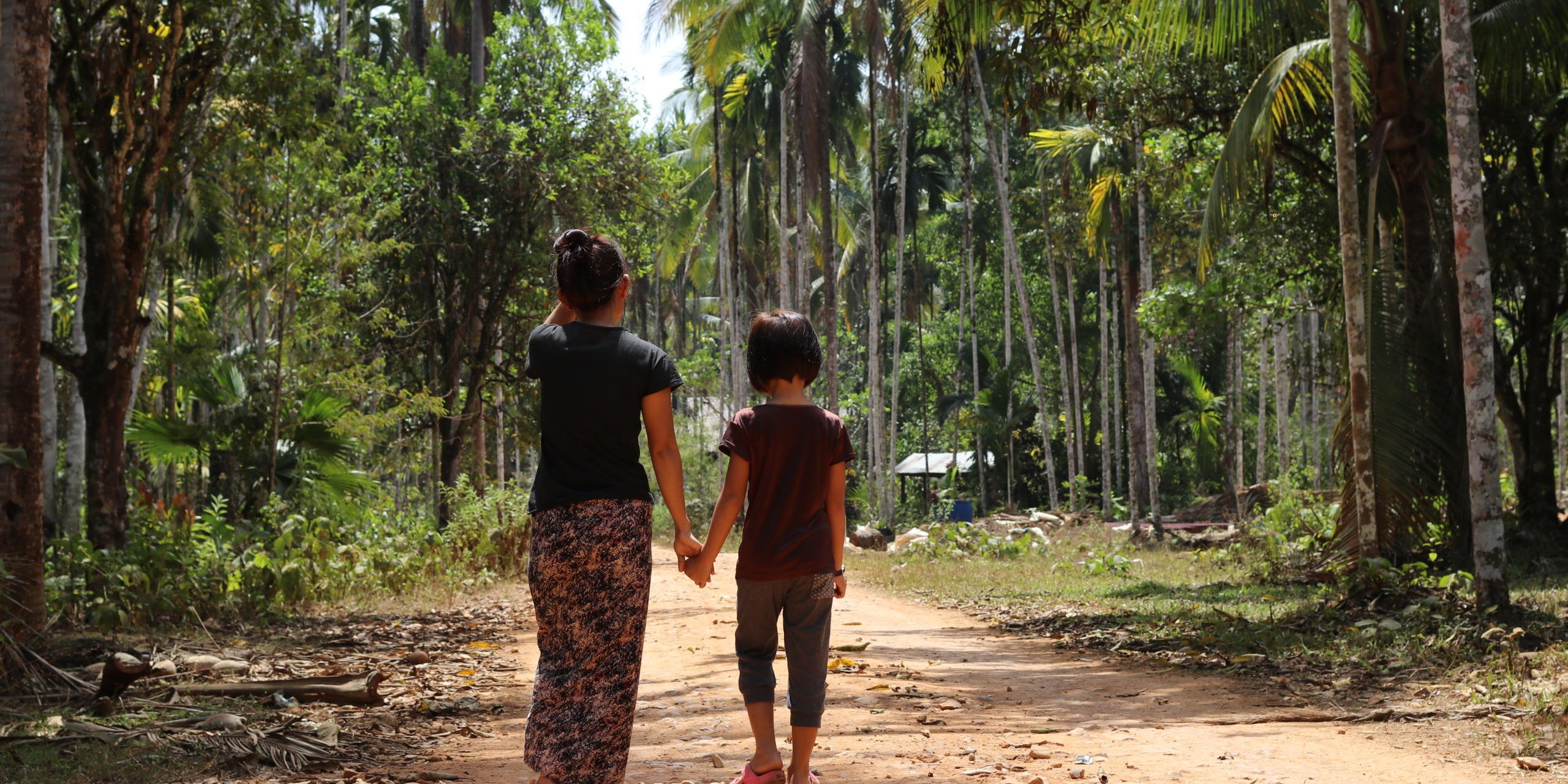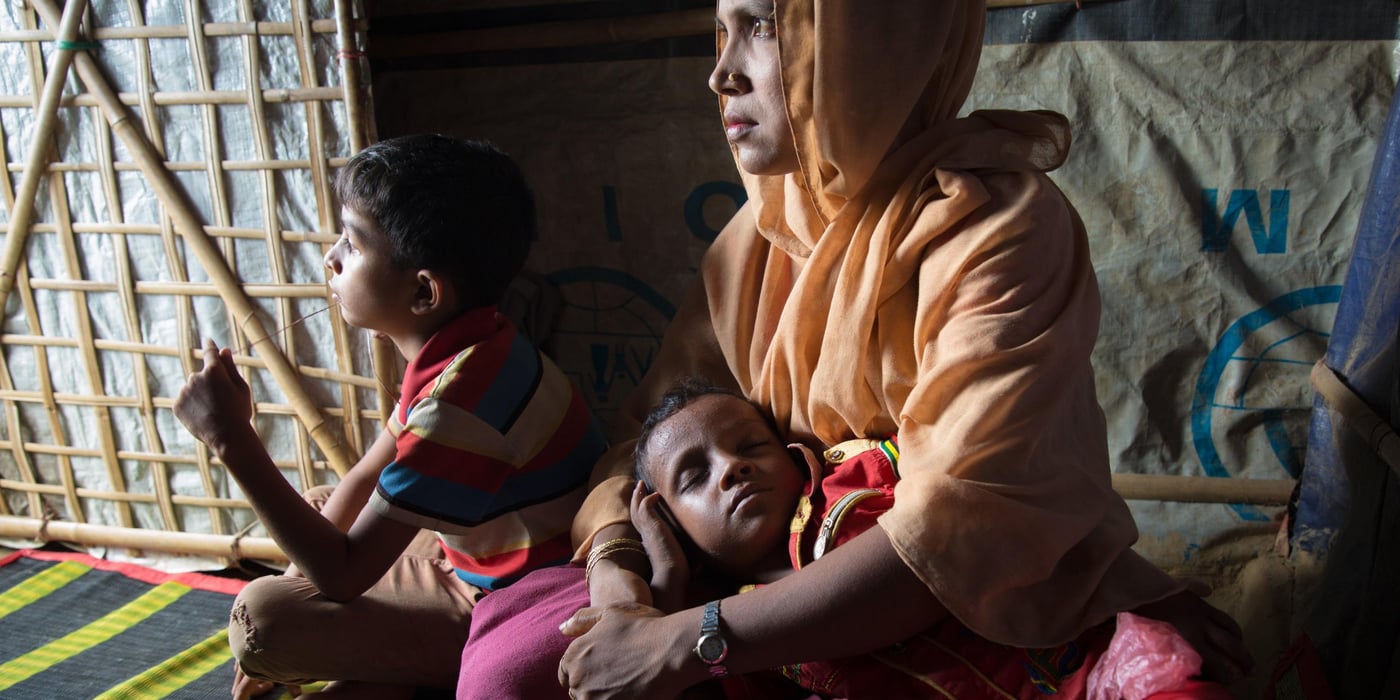
- Å hindre mennesker tilgang til grunnleggende tjenester, rettigheter og beskyttelse, vil undergrave enhver økonomisk eller politisk fremgang i landet, advarer Prasant Naik, Flyktninghjelpens landdirektør i Myanmar.
- Man kan ikke kalle utviklingen i landet en suksess så lenge de mest sårbare i samfunnet faller utenfor, uten muligheter til å skape trygge og gode liv for familiene sine, sier han.
Etniske minoritetsgrupper i Myanmar har vært i konflikt med militæret og regjeringen i flere tiår. 644.000 mennesker er drevet på flukt fra sine hjem som følge av vold, mange mangler tilgang til grunnleggende tjenester som helse og utdanning. Over 500.000 mennesker i Myanmar er avhengige av nødhjelp.
- I skogen følte vi oss ikke trygge. Jeg hverken spiste eller sov, og var redd for at vi skulle dø, forteller Daw Aye Shwe, en 34 år gammel mor drevet på flukt fra hjemmet sitt i Shan-staten. Flyktninghjelpen møter henne og barna i en leir for internt fordrevne i byen Bhamo.
- Jeg er veldig bekymret for barna mine. Min største drøm er at de skal få en utdannelse. Jeg ønsker meg et fredelig Myanmar i fremtiden, sier hun. Enn så lenge er hverdagen en kamp for å overleve i leiren.
- Det er fortsatt utfordrende å nå frem med livreddende hjelp til mange deler av landet, ikke minst i delstatene Kachin, Shan og Rakhine. Tusenvis har blitt drevet på flukt gjentatte ganger. Hver gang tvinges de til å legge et helt liv bak seg, og de står igjen på bar bakke, sier Naik.
Økonomisk fremgang og en fredelig løsning på de mange konfliktene i Myanmar er viktig, men den prekære humanitære realiteten hundretusener står overfor må også tas på alvor. Hittil i år er mindre enn 40 prosent av behovet for nødhjelp i 2017 dekket, viser beregninger fra FN.
Noen fakta:
- I den humanitære handlingsplanen for Myanmar i år, en plan FN og humanitære partnere legger frem for å kunne nå de aller mest trengende med livreddende hjelp, har man bedt om 1,26 milliarder kroner. Mindre enn 40 prosent av disse midlene er så langt samlet inn.
- I den humanitære behovsplanen kommer det frem at mer enn en halv million mennesker trenger akutt og livreddende hjelp i de tre delstatene Kachin, Shan og Rakhine. Det er i disse delstatene man finner flertallet av mennesker drevet på flukt i landet.
- Handlingsplanen viser at det er et særlig behov for utdanning (141.000 mennesker), trygg tilgang til mat og et livsgrunnlag (384.000 mennesker), helsetjenester (474 .000 mennesker), livreddende ernæring (122.000 barn), beskyttelse mot vold og overgrep (244.000 mennesker), et tak over hodet (219.000 mennesker), og rent vann og sanitære tjenester (356.000 mennesker).
- Myanmar er på Flyktninghjelpens liste over de ti mest neglisjerte fluktkrisene i verden. Dette skyldes manglende innsats for politiske løsninger, lite oppmerksomhet knyttet til fluktsituasjonen, samt mangel på økonomisk støtte for å lette lidelsene mange sivile står overfor.
Flyktninghjelpen i Myanmar:
- Flyktninghjelpen har jobbet i Myanmar siden 2008.
- Flyktninghjelpen jobber i elleve områder: Bago, Tanintharyi, Kayin, Kayah, Mon, Rakhine, Chin, Kachin, Nord- og Sør Shan og Yangon.
- I 2016 hjalp Flyktninghjelpen 220.333 mennesker i landet. 16.000 mennesker har hatt nytte av Flyktninghjelpens utdanningsprogram, 13.000 har fått hjelp til å skaffe seg et tak over hodet, 8.000 mennesker har bodd i leirer støttet av Flyktninghjelpen, 96.000 mennesker har fått juridisk støtte og rådgivning, mens 17.000 mennesker har hatt nytte av Flyktninghjelpens arbeid med å sikre tilgang til rent vann og sanitæranlegg.
- En halv million fordrevne og marginaliserte mennesker har fått tilgang til grunnleggende rettigheter gjennom Flyktninghjelpens arbeidet med utstedelse av ID-papirer.
Til redaksjonen:
- Bilder og sitater fra mennesker drevet på flukt I Myanmar, til fri bruk, kan man finne på denne linken.
- B-roll som viser forholdene fordrevne i Myanmar lever under, også til fri bruk, finner dere her.
- Vi har talspersoner i Myanmar som snakker engelsk og norsk.
Pressekontakter:
Tuva Bogsnes, Leder for medieseksjonen, tubo@nrc.no, 932 31 883.
Becky Bakr Abdulla, Medierådgiver, beba@nrc.no, 416 13 766.
Media hotline, info@nrc.no, 905 62 329.


